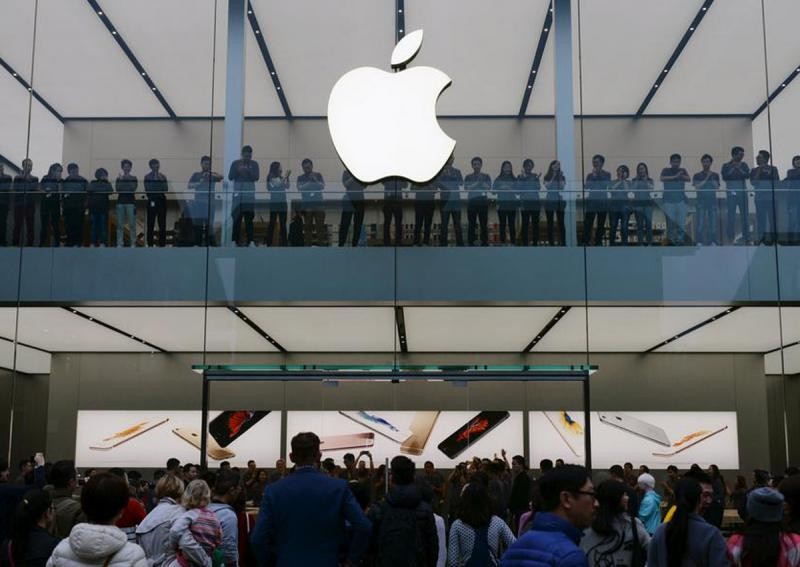Why has Wall Street fallen out of love with Apple?

For so many years, Apple could seemingly do no wrong in the eyes of investors. Of late, the opposite is true.
Shares of the iPhone maker have plunged 19 per cent in the past six months, a stretch that's seen Alphabet, Facebook, Amazon.com and Microsoft each jump 18 per cent to 45 per cent. Apple dropped 2.6 per cent on Tuesday to US$102.71 (S$147.26), the lowest close since October 2014, and briefly fell below US$100 in premarket trading Wednesday. (It was down less than 2 per cent as of midmorning.)
Investors are only paying 11.1 times earnings for the stock, 27 per cent below the five-year average price-to-earnings ratio, according to FactSet. Meanwhile, Alphabet's market cap is as close as it's been to Apple's since 2010, with the two now separated by US$55 billion.
Apple vs Tech

"It's the most controversial stock in the world because everyone has an opinion about Apple and its products," said Pat Becker Jr., a portfolio manager at Becker Capital Management, which oversees US$2.8 billion and owns Apple shares. "Down at this price and trading at the valuation it is relative to the market and relative to its peer group, it looks very inexpensive."
That's a very different way of talking about Apple than in years past, when the Cupertino, California-based company was setting the technology agenda. With the iPhone now accounting for two-thirds of revenue, iPad sales declining in 2015 and Mac sales barely budging, Apple is finding itself reliant on a single product to drive growth.
And that product faces ever increasing global competition from lower-cost manufacturers running Google's Android operating system.
Analysts are predicting sales growth of less than 4 per cent in 2016 and 6 per cent in 2017, according to Thomson Reuters, down from more than 40 per cent as recently as 2012. The Apple Watch hasn't yet become the killer product that Apple fanatics predicted, though some blogs are reporting that the second-generation, more feature-rich device will be introduced in March.
An Apple spokesperson declined to comment for this story.
At its current stock price, Apple sits in an investor's no-man's land, says Eric Barden of Barden Capital Management in Austin, Texas.
Growth investors have been selling out of the name in favour of Facebook, Amazon, Alphabet and Netflix. Stock buybacks and dividends should attract value investors, but Apple's dividend yield (the amount it's paying out relative to the stock price) of 2 per cent is below that of Microsoft, Cisco, IBM or Intel.
"Right now, it's going to be transitioning from a growth stock, and I just don't know that it's cheap enough to get value investors on board yet," said Barden, who owns Microsoft shares. However, Apple "is getting to the point where it's going to be too cheap to ignore," he said.
Apple's 4.6 per cent drop in 2015 marked the stock's first annual decline since the 2008 financial crisis, when it plunged 57 per cent. Analysts remain bullish - 82 per cent of those covering the stock have a buy rating, according to FactSet.
The new year got off to an ominous start, with Japan's Nikkei financial news service reporting this week that Apple may cut its iPhone 6s and 6s Plus output by about 30 per cent between January and March.
In a note following the story, Piper Jaffray analyst Gene Munster said his firm's conversations with 10 investor groups suggest that money managers are betting as few as 50 million iPhones will be sold in the quarter, compared with Wall Street estimates of 58.5 million.
Munster added that investors are already pricing in that risk and said the stock should get a boost after the company provides its own guidance on Jan. 26.
There's always a danger in not holding Apple shares. Unlike with any other company, product announcements can drive the price higher and generate momentum well before the financials catch up. On Wednesday, the company announced it sold more than US$1.1 billion in apps and in-app purchases during the weeks of Christmas and New Year's. On Jan. 1 alone, it broke its single-day record with more than US$144 million in app sales.
Barden said he sold his position in 2013, missing out on a 40 per cent rally the following year.
That gets back to Becker's point about product-cycle hype determining whether the stock is in or out of favour.
And while the stock has clearly been on the wrong side of that equation for the past six months, Becker sees too much value in the Apple ecosystem to give up on its prospects.
"You're not going to have a new competitor pop up in this area," he said.